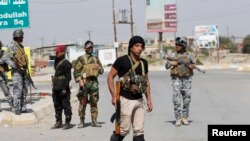Islamic State fighters traded sniper fire and mortar rounds with Iraqi troops and allied Shi'ite militia forces on Sunday in the city of Tikrit amid reports the militants had used chlorine as a chemical weapon elsewhere in the country earlier this year.
A military official returned from the front in Tikrit said no major advances were made by either side nearly two weeks into an operation to win back the city Islamic State fighters seized last June.
Also Sunday, the United States and coalition partners carried out seven airstrikes against Islamic State militants in Iraq and four in Syria since Saturday, the U.S. military said.
The raids in Iraq hit Islamic State tactical units, vehicles, excavators and staging areas near al Asad, al Hawayja, al Qaim, Falluja, Ramadi and Tal Afar, the Combined Joint Task Force said in a statement.
The airstrikes in Syria were focused near Kobani, at the border with Turkey, and destroyed nine Islamic State combat positions and a vehicle, the statement said.
Chlorine allegations
On Saturday, Iraqi Kurdish authorities said they had proof the radical Islamist militants occupying large parts of the country's north and west used chlorine against Kurdish peshmerga fighters in January in a car bombing attempt west of the city of Mosul.
The Baghdad government has not issued a statement on the semi-autonomous Kurdish region's announcement. An official reached by Reuters on Sunday declined to comment.
But the mayor of a town on the northern edge of Tikrit told Reuters that storage containers filled with chlorine were found by troops and mainly Shi'ite militiamen when they entered al-Alam last week, the day before they fought their way into Tikrit.
“We found a number of storage units containing chlorine that we think were seized by Daesh from water purification stations in different parts of Tikrit,” Laith al-Jubouri said, using the Arabic acronym for the group. He said security forces had sealed off the area where the containers were found and alerted Baghdad authorities.
On Tuesday, when Iraqi forces and allied militias pushed Islamic State fighters out of the town, a Reuters photographer was present when Iraqi police instructed journalists to stand back and hold their breath as they detonated a roadside bomb they suspected contained chlorine.
When they detonated the bomb, a yellowish plume burst into the air, and as bystanders coughed, officials shouted, “Be careful! It's chlorine,” the Reuters photographer said.
The statement from Kurdish authorities about Islamic State fighters' use of chlorine referred to footage of “similar attacks” during the recent fighting around Tikrit, though the mayor and another security official only noted the presence of stockpiles of chlorine found in areas recently seized back from Islamic State fighters.
Awaiting reinforcements
The military campaign to retake Tikrit has been stalled since Friday, when security officials said Iraqi forces and their militia allies would wait for reinforcements before moving forward.
Two days later, back-up had not yet arrived, and officials continued to stress the challenges they faced in flushing out militants in street-by-street battles and defusing bombs and booby traps they laid while retreating from parts of the city.
“There were no new pushes today from either side, only scattered skirmishes in the northern and southern parts of the city,” Colonel Mohammed Abid al-Jubouri told Reuters by phone after visiting the southern edge of Tikrit on Sunday.
Jubouri said the process of “organizing troops and waiting for reinforcements” was ongoing and did not say when a fresh effort to seize the central districts of the city still held by IS would begin. The militants still hold about half the city, which lies about 160 kilometers (100 miles) north of Baghdad.
The massively outnumbered Islamic State fighters are completely boxed in but protected by snipers and thousands of bombs they planted across the city.
Karim al-Nuri, a top leader of the Badr militia and spokesman of the volunteer Popular Mobilisation units, told the French news agency AFP it would take no more than "72 hours" to liberate Tikrit from the Islamic State, which seized it last summer.
The last defenders are holed up in the city center and "surrounded from all sides," Nuri said.
The effort to retake Saddam Hussein's home city from the militants who overran it last year has been the biggest offensive yet against the group that has declared an Islamic caliphate on territory it controls in Iraq and neighboring Syria.
Meanwhile, dozens of fighters with the militia loyal to radical Shi'ite cleric Muqtada al-Sadr left Iraq's capital Sunday to take part in the offensive to capture Tikrit from the Islamic State group, The Associated press reported.
Men from Iraq's Peace Brigade left to the Shi'ite holy city of Samarra, the launching point for operations to recapture Saddam Hussein's hometown. About a dozen heavily armed trucks packed with fighters left Baghdad earlier Sunday.
"We are traveling to help the community of Muslims and to help the people of Iraq," Ali al-Mousawi, a spokesman for the brigade, told the AP.
Iraqi officials say that at least 30,000 men -- including soldiers, Shiite militiamen, Sunni tribes and police officers -- are fighting to seize Tikrit. U.S. General Martin Dempsey said Wednesday that at least 20,000 militiamen are taking part in the offensive.
Some material for this report came from AP and AFP.





